外研版高中必修二Module3 Music ---Grammar课件(共64张PPT)
文档属性
| 名称 | 外研版高中必修二Module3 Music ---Grammar课件(共64张PPT) | 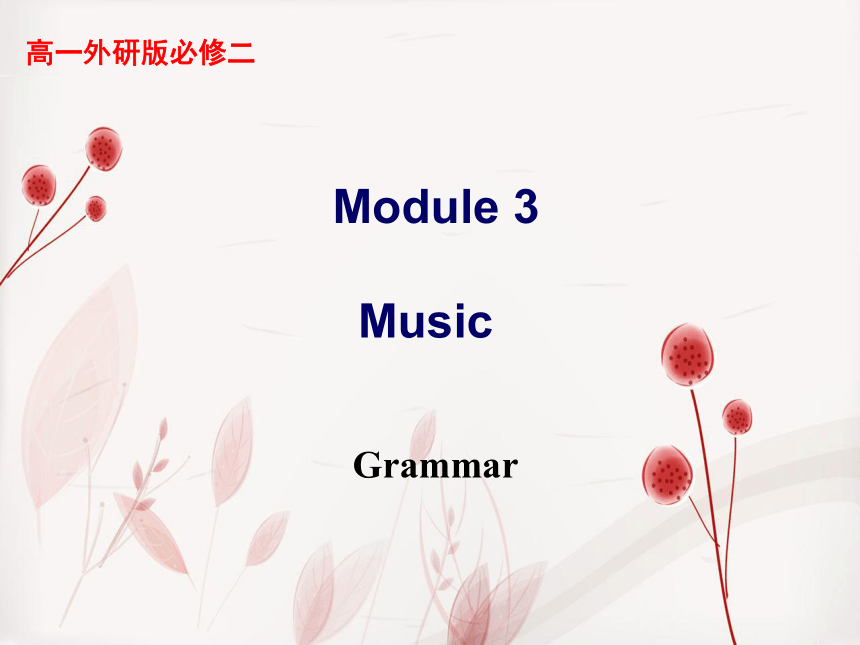 | |
| 格式 | zip | ||
| 文件大小 | 3.0MB | ||
| 资源类型 | 教案 | ||
| 版本资源 | 外研版 | ||
| 科目 | 英语 | ||
| 更新时间 | 2021-06-17 17:10:40 | ||
图片预览

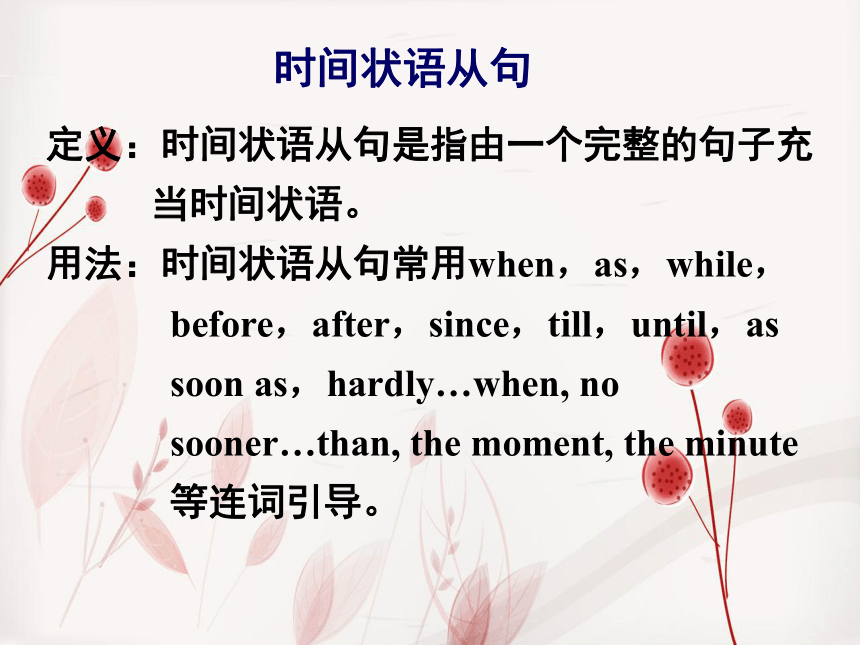
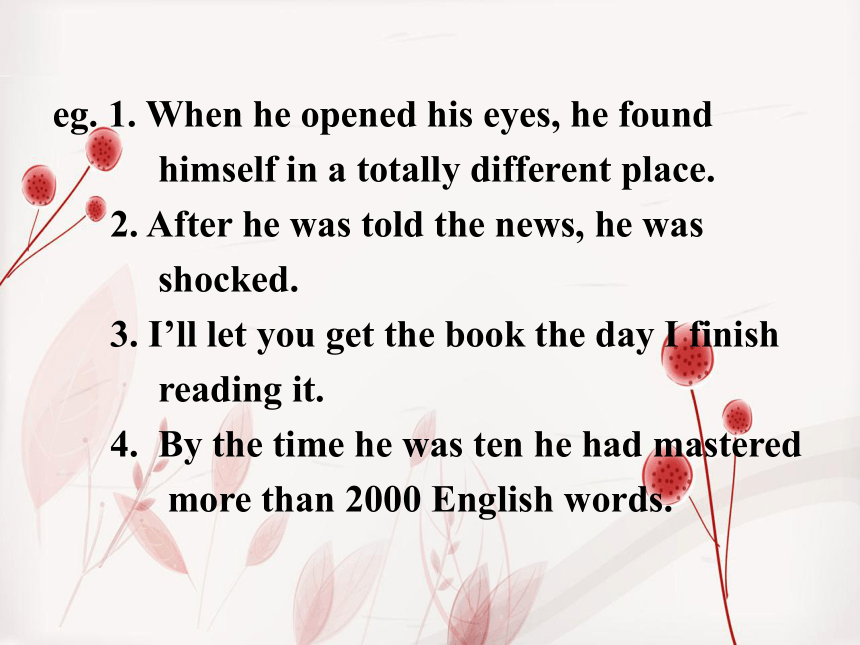
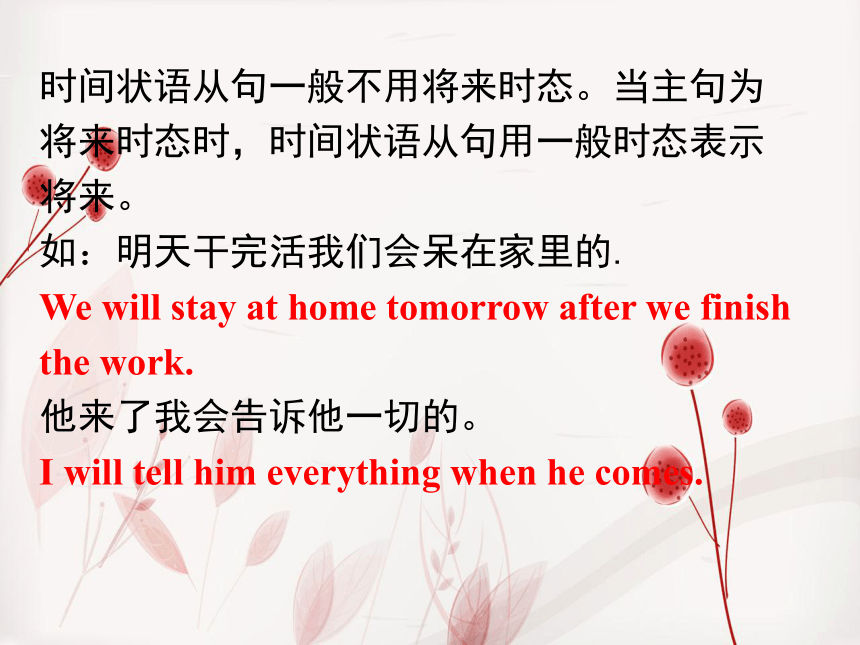
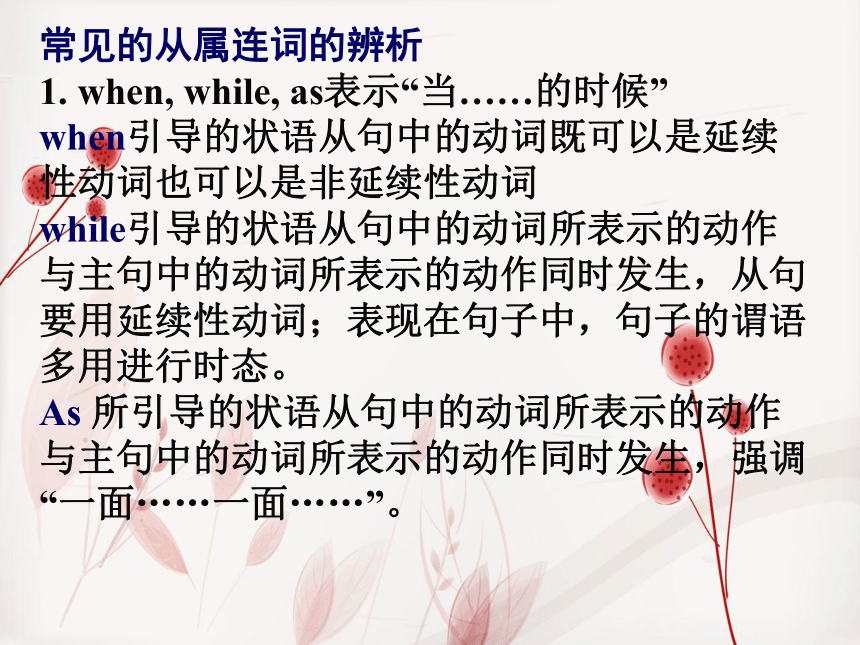
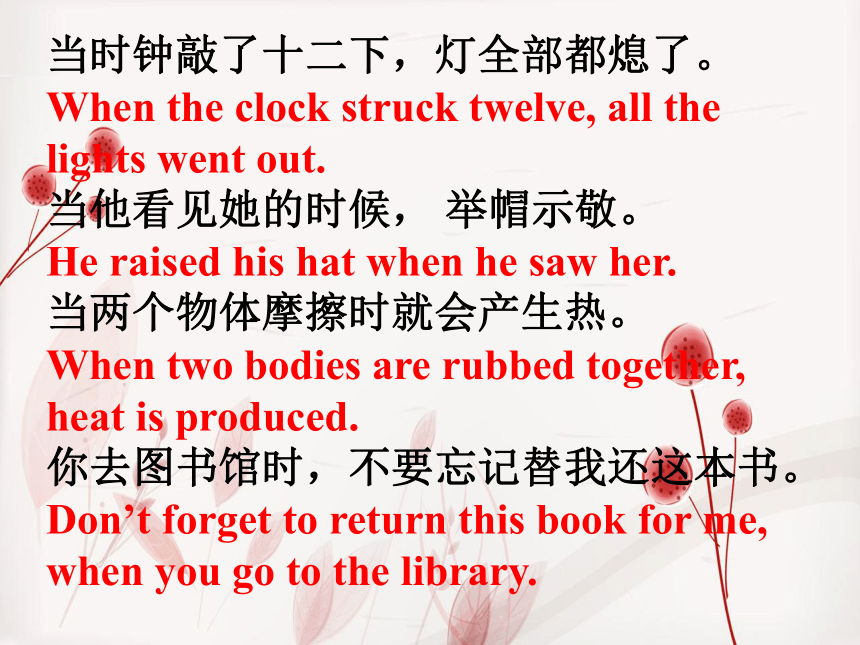
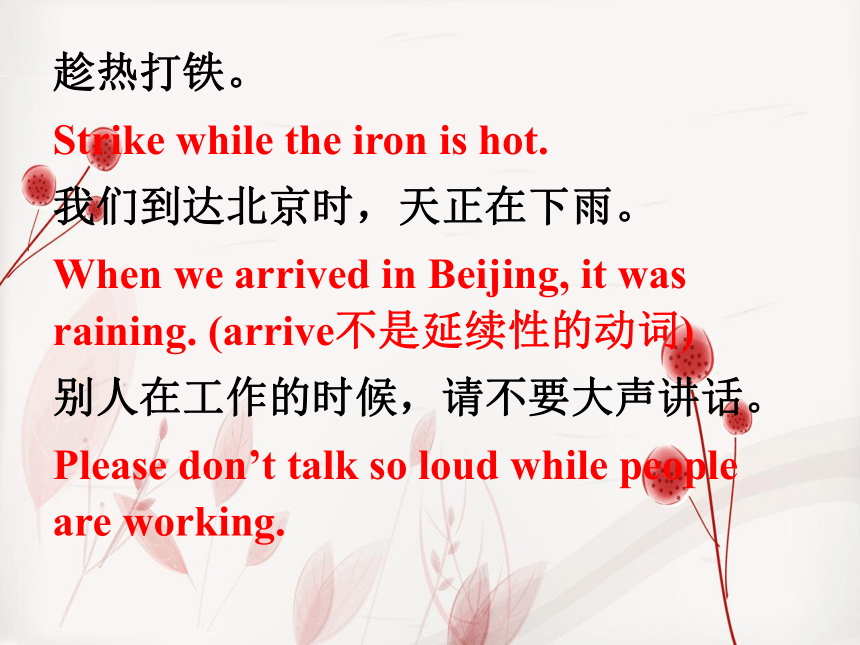
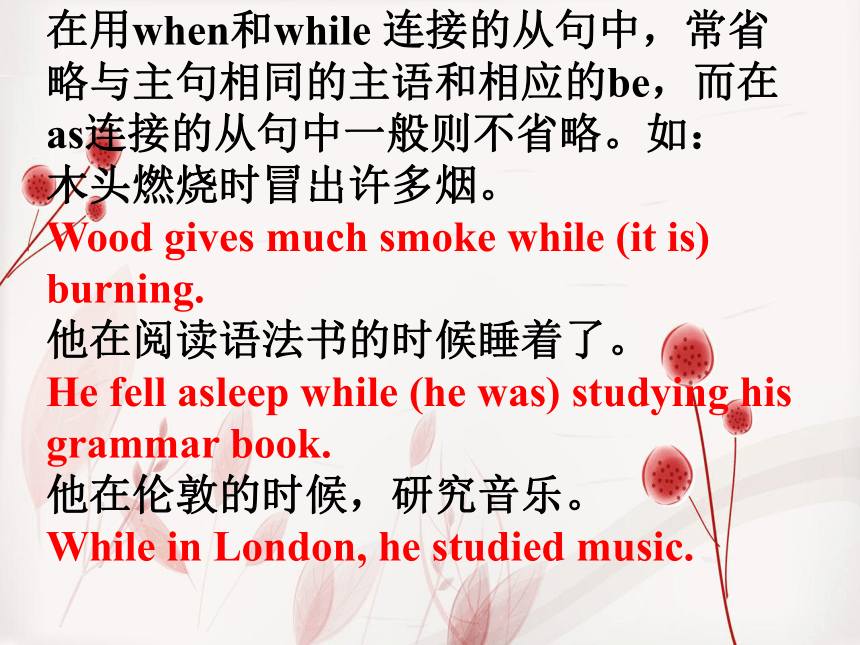
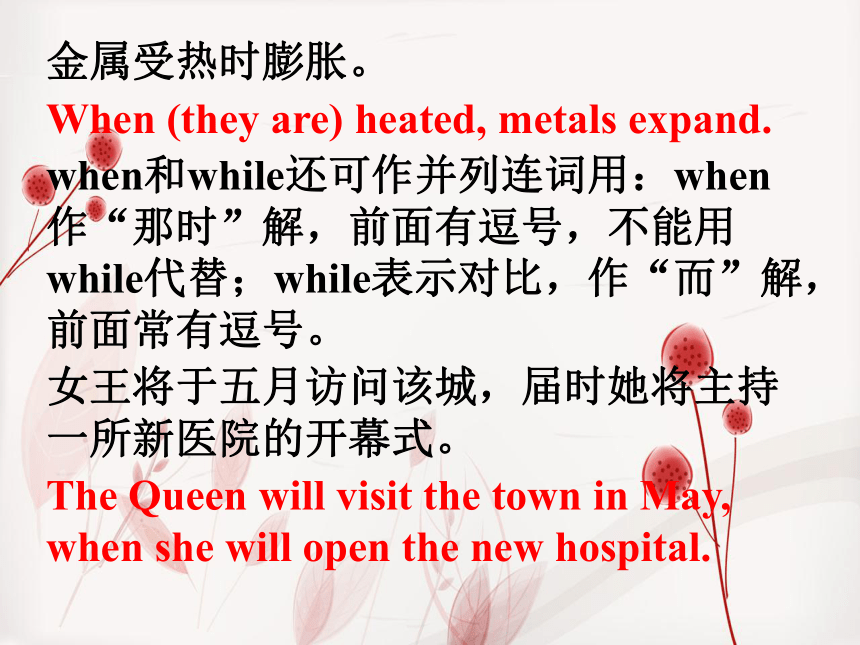
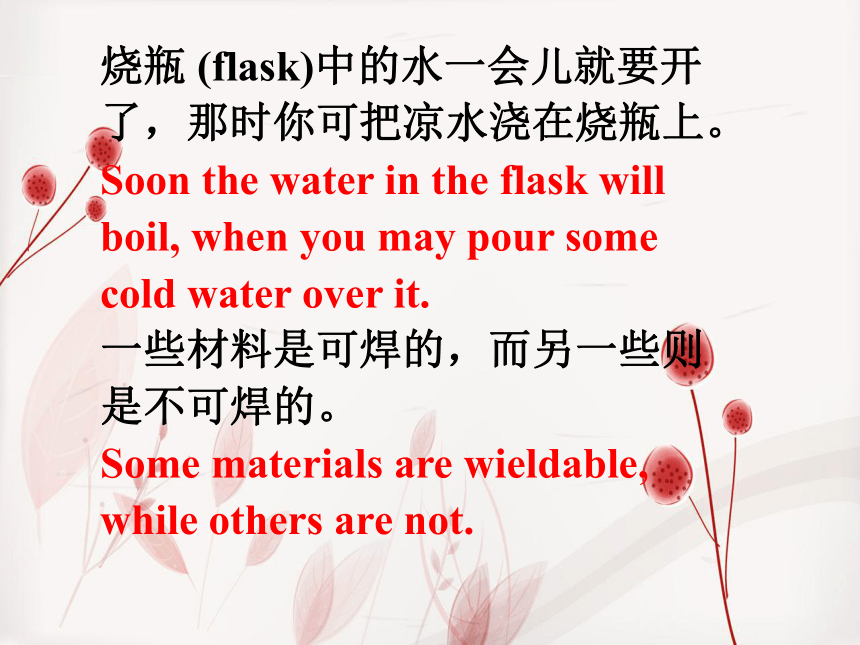

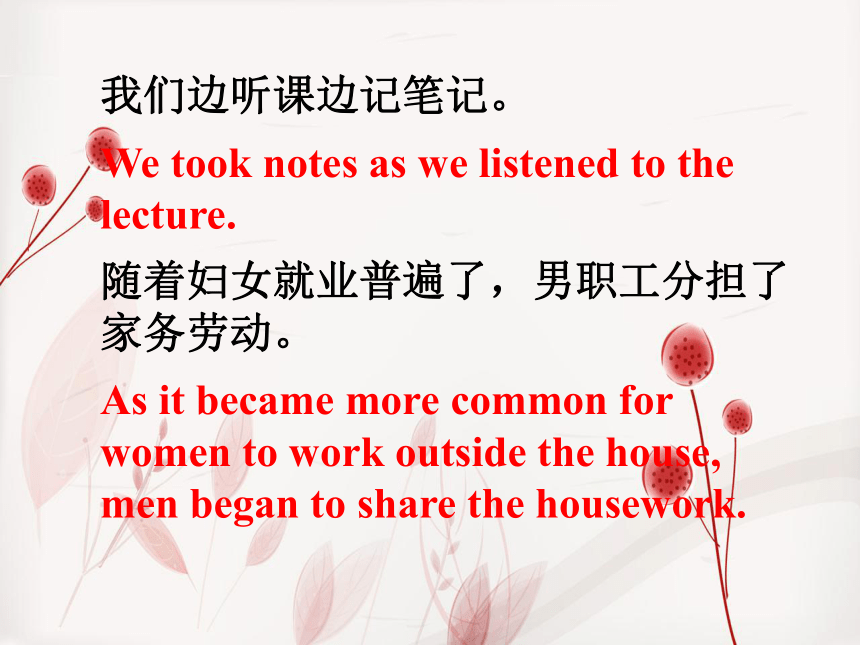
文档简介
(共64张PPT)
高一外研版必修二
Module
3
Music
Grammar
时间状语从句
定义:时间状语从句是指由一个完整的句子充
当时间状语。
用法:时间状语从句常用when,as,while,
before,after,since,till,until,as
soon
as,hardly…when,
no
sooner…than,
the
moment,
the
minute
等连词引导。
eg.
1.
When
he
opened
his
eyes,
he
found
himself
in
a
totally
different
place.
2.
After
he
was
told
the
news,
he
was
shocked.
3.
I’ll
let
you
get
the
book
the
day
I
finish
reading
it.
4.
By
the
time
he
was
ten
he
had
mastered
more
than
2000
English
words.
时间状语从句一般不用将来时态。当主句为
将来时态时,时间状语从句用一般时态表示
将来。
如:明天干完活我们会呆在家里的.
We
will
stay
at
home
tomorrow
after
we
finish
the
work.
他来了我会告诉他一切的。
I
will
tell
him
everything
when
he
comes.
???
常见的从属连词的辨析
1.
when,
while,
as表示“当……的时候”
when引导的状语从句中的动词既可以是延续
性动词也可以是非延续性动词
while引导的状语从句中的动词所表示的动作
与主句中的动词所表示的动作同时发生,从句
要用延续性动词;表现在句子中,句子的谓语
多用进行时态。
As
所引导的状语从句中的动词所表示的动作
与主句中的动词所表示的动作同时发生,强调
“一面……一面……”。
当时钟敲了十二下,灯全部都熄了。
When
the
clock
struck
twelve,
all
the
lights
went
out.
当他看见她的时候,
举帽示敬。
He
raised
his
hat
when
he
saw
her.
当两个物体摩擦时就会产生热。
When
two
bodies
are
rubbed
together,
heat
is
produced.
你去图书馆时,不要忘记替我还这本书。
Don’t
forget
to
return
this
book
for
me,
when
you
go
to
the
library.
趁热打铁。
Strike
while
the
iron
is
hot.
我们到达北京时,天正在下雨。
When
we
arrived
in
Beijing,
it
was
raining.
(arrive不是延续性的动词)
别人在工作的时候,请不要大声讲话。
Please
don’t
talk
so
loud
while
people
are
working.
在用when和while
连接的从句中,常省略与主句相同的主语和相应的be,而在as连接的从句中一般则不省略。如:
木头燃烧时冒出许多烟。
Wood
gives
much
smoke
while
(it
is)
burning.
他在阅读语法书的时候睡着了。
He
fell
asleep
while
(he
was)
studying
his
grammar
book.
他在伦敦的时候,研究音乐。
While
in
London,
he
studied
music.
金属受热时膨胀。
When
(they
are)
heated,
metals
expand.
when和while还可作并列连词用:when作“那时”解,前面有逗号,不能用while代替;while表示对比,作“而”解,前面常有逗号。
女王将于五月访问该城,届时她将主持一所新医院的开幕式。
The
Queen
will
visit
the
town
in
May,
when
she
will
open
the
new
hospital.
烧瓶
(flask)中的水一会儿就要开了,那时你可把凉水浇在烧瓶上。
Soon
the
water
in
the
flask
will
boil,
when
you
may
pour
some
cold
water
over
it.
一些材料是可焊的,而另一些则是不可焊的。
Some
materials
are
wieldable,
while
others
are
not.
凯特边走边读书。
Kate
read
the
book
as
she
went
along.
当汽车行驶得越来越快时,它得到的动能也越来越多。
As
the
car
moved
faster
and
faster,
it
gained
more
and
more
kinetic
energy.
我们边听课边记笔记。
We
took
notes
as
we
listened
to
the
lecture.
随着妇女就业普遍了,男职工分担了家务劳动。
As
it
became
more
common
for
women
to
work
outside
the
house,
men
began
to
share
the
housework.
用
when/
while/
as
填空:
1.
_________
he
comes
tomorrow,
I
shall
ask
where
he
has
been.
2.
____________
he
was
speaking,
everybody
listened
carefully.
3.
I
saw
her
just
_________
she
was
getting
off
the
train.
When
While
/
When
as
When
it
was
performed
in
America,
there
was
an
audience
of
100,000
people.
2.
When
he
was
very
young,
Mozart
had
a
lot
of
musical
talent.
3.
While
he
was
still
a
teenager,
he
was
a
big
star.
4.
As
he
grew
older,
he
began
to
go
deaf.
“When”
is
used
when
the
sentences
refer
to
a
single
event
in
the
past.
“When”
and
“while”
are
used
when
the
sentences
refer
to
a
period
of
time
in
the
past.
“As”
is
used
when
the
sentences
refer
to
a
progressive
change.
Match
the
two
parts
of
the
sentences.
Answer:
1.
b
d
c
a
Work
in
four.
Make
sentences
similar
to
those
in
Part
2,
using
when,
by
the
time,
while,
as.
Possible
answers:
While
he
was
a
child,
he
lived
in
the
countryside.
When
he
was
young,
he
lived
with
his
grandmother.
When
he
lived
in
Hunan
Province,
he
collected
folk
songs
and
music.
While
he
lived
in
Hunan
Province,
he
planted
rice.
When
he
attended
Central
Conservatory
of
Music,
he
heard
western
music
for
the
first
time.
2.
till
,
until
表示“一直到……时”,用till,主句和从
句都用肯定形式。表示“直到……才”
时,用
until,主句用否定形式,从句用
肯定形式,间或也用till。until可放句首。
如:
到他妈妈进来他才起床。
He
didn't
get
up
until
his
mother
came
in.
那个年轻人看书一直到熄灯。
The
young
man
read
till
the
light
went
out.?
用till/
until填空
1.
I
waited
________
he
came
back.
2.
It
was
not
________
he
took
off
his
eyeglasses
that
I
recognized
him.
3.
He
did’t
study
_________
it
was
8
clock.
till/until
until
till/
until
3.
hardly/scarcely…when;
no
sooner…than;
as
soon
as
…表示“一……就……”。在hardly/scarcely…when和no
sooner…than句型中,when和than引导的从句不能放在主句之前;
而as
soon
as引导的从句,既可放在主句前,也可放在主句之后。hardly/scarcely
及no
sooner如置于句首,句子要倒装。如:
例如:
I
had
no
sooner
opened
the
door
than
he
rushed
out.=
I
had
hardly
opened
the
door
when
he
rushed
out.
=
Hardly
had
I
opened
the
door
when
he
rushed
out.=
No
sooner
had
I
opened
the
door
than
he
rushed
out.
=
As
soon
as
I
opened
the
door
he
rushed
out.=
He
rushed
out
as
soon
as
I
opened
the
door.
4.
Before
在……之前
乘客们应该在飞机起飞前的一小时到达机场。
The
passengers
should
arrive
at
the
airport
an
hour
before
the
flight
departs.
他在我可以阻止他之前跑了。
He
ran
off
before
I
could
stop
him.
我不久之后就把它全忘了。
It
was
not
long
before
I
forgot
it
all.
5.
After
在……之后
她下课后就回家了。
She
went
home
after
class.
乘客们都登机后飞机就起飞了。
The
plane
took
off
after
all
the
passengers
aboarded.
6.
Since自从……,
通常主句用现在完成时。
在我大学毕业后我就从没再去过那儿
I
have
never
been
there
again
since
I
graduated
from
the
university.
自从他成为领航员之后,这个船长几乎游遍了世界各地。
The
captain
has
traveled
almost
everywhere
in
the
world
since
he
became
a
pilot.
7.
As
soon
as
一……就……
Jack
went
to
school
as
soon
as
he
got
well.
杰克一好就去上学了。
I’ll
ring
you
up
as
soon
as
I
get
an
answer
from
him.
我一得到他的答复就会给你打电话。
8.
Once
一旦……就……
一旦见到他,
你就再也忘不掉他了。
Once
you
see
him,
you
will
never
forget
him.
你一旦把邮件发出去以后就再也不能撤回它了。
You
can’t
get
the
email
back
once
you
have
sent
it
away.
9.
every
time,
each
time,
next
time,
the
first
time,
any
time,
all
the
time等
名词短语用来引导时间状语从句,表示
“每当……,每次……
;下次……”等。
Teacher:
Bob,
can
you
explain
inflation?
Bob:
Sure.
Every
time
my
dad
pays
the
bills,
he
blows
up.
That’s
inflation.
老师:Bob,你能解释一下通货膨胀吗?
Bob:当然。我爸爸每次付
帐单时,他就发脾气(爆炸),那就是通货膨胀。
10.
before
long
/
long
before
:
before
long
(=
soon;
by
and
by)
不久以
后,与过去时或将来时连用。long
before/ago
很久以前,
常与过去时连用。
It
be
+
时间
+
before
从句
这本书在不久以后就会出版。
The
book
will
be
published
before
long/soon.
不久之后他们就离开了这座城市。
They
left
the
city
before
long/soon.
他很久以前就离开了他的家乡。
He
had
left
his
homeland
long
before
liberation.
我们不久之后就会再见面的。
It
won’t
be
long
before
we
meet
again.
It
is
long
before…
很久才……
It
won’t
be
long
before…
不久
就
……
考题:
____
he
will
return
to
his
native
land.
It
is
long
before
that
It
is
before
long
that
It
won’t
be
long
before
It
will
be
before
long
that
1.
我们到这个城市很久之前,
彼此就认识.
We
had
known
each
other
long
before
we
came
to
this
city.
B
2.
我希望不久后再见到你.
I
hope
I
will
meet
you
again
before
long/soon.
3.
他们早就把工作完了.
They
(had)
finished
the
work
long
before/ago.
1.
I
had
been
waiting
__
before
Joan
arrived.
A.
some
time
B.
sometime
C.
some
times
D.
sometimes
2.
Mind
where
you
are
going
__a
car
hits
you.
A.
while
B.
when
C.
after
D.
before
3.
Write
down
the
phone
number
___
you
forget
it.
A.
while
B.
when
C.
after
D.
before
A
D
D
4.
Shake
the
medicine
well
__
you
take
it.
A.
when
B.
when
C.
while
D.
before
5.
You
must
examine
your
test
paper
well
__
you
hand
it
in.
when
B.
when
C.
while
D.
before
D
D
Translate
these
sentences
into
English
1.
他从学校回来时,他妈妈正在烧饭。
When
he
returned,
his
mother
was
cooking.
2.
他在看书时,他的妻子一直在烧饭。
While
he
was
reading,
his
wife
was
cooking.
3.
他一边烧饭一边唱歌。
As
he
cooked,
he
sang.
4.
我们正要动身,这时天突然下雨了。
We
were
about
to
start
when
it
began
to
rain.
5.
你喜欢踢足球而我喜欢弹钢琴。
You
like
playing
football
while
I
like
playing
the
piano.
6.
随着时间的推移,我们都渐渐长大了。
As
time
went
by,
we
all
grew
up.
For
more
exercises,
click
here.
1.
---
Are
you
ready
for
Spain?
---
Yes,
I
want
the
girls
to
experience
that
___
they
are
young.
(2008上海)
A.
while
B.
until
C.
if
D.
before
2.
I
used
to
love
that
film
___
I
was
a
child,
but
I
don’t
feel
it
that
way
any
more.
(2008辽宁)
A.
once
B.
when
C.
since
D.
although
高考题
A
B
3.
_____
the
Internet
is
of
great
help.
I
don’t
think
it’s
a
good
idea
to
spend
too
much
time
on
it.
(2008湖南)
A.
If
B.
While
C.
Because
D.
As
4.
There
were
some
chairs
left
over
_____
everyone
had
sat
down.
(2008四川)
A.
when
B.
until
C.
that
D.
where
B
A
5.
Nancy
enjoyed
herself
so
much
____
she
visited
her
friends
in
Sydney
last
year.
(2008福建)
A.
that
B.
which
C.
when
D.
where
6.
I’m
sorry
you’ve
been
waiting
so
long,
but
it’ll
still
be
some
time
___
Brian
get
back.
(2008北京)
A.
before
B.
since
C.
till
D.
after
C
A
过去完成时的构成
助动词
had
+
过去分词
When
I
got
to
the
station,
the
train
had
left.
2.
过去完成时的用法:
主要是表示在过去某个时间,或是动作之
前已经发生或完成的动作。也就是过去的
过去。
3.
常用的几种方式:
The
Past
Perfect
Tense
过去完成时
(1)
用介词by,
before
等构成的时间短语。
eg.
到这个月末,我们已经学习了20首英文歌。
We
had
learnt
20
English
songs
by
the
end
of
last
month.
(2)用连词when,
before,
after或者短语by
the
time引导的时间状语从句。
当我到达机场时,飞机已经起飞了。
The
plane
had
taken
off
when
I
reached
the
airport.
在我起床前,我哥哥就已经从家里出发了。
By
the
time
I
got
up,
my
brother
had
left
home.
今天上午十点钟前,他已完成了这项工作。
He?had?finished?the?work?before?ten?
o'clock?this
morning.
(3)
在when,before等引导的时间状语
从句中,如果时间状语从句的动作
发生在主句之后,则主句用过去完
成时,从句用一般过去时。
在我妈妈回来之前,我已经完成了作业。
I?had?already?finished?my?homework?
before?my
mother?returned.
我到运动场时,比赛已经开始了。??
The?match?had?already?begun?when?I
got?to?the?playground.
(4)
过去完成时还可表示从过去某一时间开始,持续到过去另一时间的动作或状态,往往和由for,?since引导的,表示一段时间的短语或从句连用。?
在我爸爸搬到这里之前,他已在学校工作五年了。?
My?father?had?worked?in?the?school?for
five?years?before?he?moved?here.?
昨天我看到了王楠。自离开学校以来,我们都没有见过面。
I?saw?Wang?Nan?yesterday.We?had?
not?seen?each?other?since?we?left?
school.
四.
表示意向的动词,如hope,
wish,
expect,
think,
intend,
mean,
suppose等,
用过去完成时表示“原本……,未
能……”
我们本希望你能来的,但是你没有。
We
had
hoped
that
you
would
come,
but
you
didn’t.
Read
these
extracts
and
answer
the
questions.
1.
After
they
had
become
stars
in
their
own
country,
the
Beatles
toured
the
United
States.
2.
Before
they
visited
India,
they
had
recorded
seven
albums.
Which
came
first-becoming
stars
in
their
own
country,
or
touring
the
United
states?
Becoming
stars
in
their
own
country.
B.
Which
came
first-visiting
India
or
recording
seven
albums?
Recording
seven
albums.
C.
What
tense
do
we
use
to
show
that
a
past
event
happened
before
another
one?
The
past
perfect
tense.
1
(a)
By
the
late
1960s,
their
music
had
changed
completely.
(b)
In
the
late
1960s,
their
music
changed
completely.
2
(a)
By
the
time
they
stopped
working
together,
they
had
sold
more
albums
than
any
other
band
in
history.
(b)
When
they
stopped
working
together,
they
sold
more
albums
than
any
other
band
in
history.
What’s
the
difference
in
maening
Between
the
(a)
and
(b)
sentences?
(a)
means
that
their
music
had
already
changed
by
then.
(b)
means
that
it
changed
then.
2.
(a)
means
that
they
had
already
sold
more
albums
by
then;
(b)means
that
they
sold
more
albums
then.
B.
Is
the
sequence
of
events
different?
Yes.
In
(a),
the
event
happened
before
that
time;
in
(b),
the
event
happened
at
that
time.
Before
Ringo
______
(join)
the
Beatles,
he
__________
(play)
drums
in
another
band.
2.
Before
they
______
(tour)
America,
the
Beatles
___________
(become)
stars
in
their
own
country.
Complete
these
sentences
with
the
verbs
in
brackets.
joined
had
played
toured
had
become
3.
Before
they
_______
(record)
Let
It
Be,
the
Beatles
___________
(record)
eleven
other
albums.
4.
After
they
____________
(record)
Let
It
Be,
the
band
_______
(split
up).
5.
After
the
group
__________
(split
up),
all
the
Beatles
_________
(perform)
as
solo
artists.
recorded
had
recorded
had
recorded
split
up
had
split
up
performed
Unfortunately,
he
_______
at
the
show
after
I
_______.
(arrive)
(leave)
2.
By
the
time
we
_______
(arrive)
at
the
stadium,
the
band
_________
(begin)
playing.
Complete
these
sentences
with
the
verbs
in
brackets.
had
left
arrived
arrived
had
begun
3.
Fortunately,
the
power
cut
________
(happen)
after
the
fans
________
(leave)
the
stadium.
4.
Before
he
_________
(make)
his
latest
album,
he
____________
(record)
some
songs
with
Paul
McCartney.
happened
had
left
made
had
recorded
他说他以前见过你。
He
said
that
he
______________
(see)
you
before.
2.
到六点钟为止他们已经工作八
小时了。
By
six
o’clock
they
___________
(work)
for
eight
hours.
had
seen
had
worked
练习题:
3.
我到广州时,他在那里很长时间
了。
When
I
came
to
Guangzhou,
he
__________
(be)
there
for
a
long
time.
4.
到上个月中旬我们在北京住了有五年时间了。
By
the
middle
of
last
month
we
______________(live)
in
Beijing
for
five
years.
had
been
had
lived
5.
她到家之前她的孩子已经睡着了。
When
she
got
home
her
children
____________(sleep).
6.
在他们到达之前电影已经开始了。
Before
they
arrived
here
the
film
_________
already
___________
(start).
had
slept
had
started
After
he
______________
(finish)
his
work
he
went
out.
2.
The
children
ran
away
after
they
___________
(break)
the
window.
3.
I
went
to
Tom’s
house
but
he
__________
(go)
out.
had
finished
had
broken
had
gone
4.
Annie
told
me
that
his
father
____________
(
go
)
to
Paris
and
he
____________
(
come
)
back
in
a
few
days.
5.
My
friend
__________
(buy)
the
car
two
years
ago.
He
________________
(buy)
it
for
two
years.
had
gone
would
come
bought
has
had
For
more
exercises,
click
here.
If
the
weather
had
been
better,
we
could
have
had
a
picnic.
But
it
____
all
day.
(2008全国II)
A.
rained
B.
rains
C.
has
rained
D.
is
raining
2.
The
hotel
wasn’t
particularly
good.
But
I
____
in
many
worse
hotels.
(2008北
京)
A.
was
staying
B.
stayed
C.
would
stay
D.
had
stayed
高考题
A
D
3.
We
first
met
on
a
train
in
2000.
We
both
felt
immediately
that
we
____
each
other
for
years.
(2008辽宁)
A.
knew
B.
have
known
C.
had
known
D.
know
4.
The
moment
I
got
home,
I
found
I
__
my
jacket
on
the
playground.
(2008陕西)
A.
had
left
B.
left
C.
have
left
D.
was
leaving
C
A
Homework
Review
what
your
have
learnt
today.
高一外研版必修二
Module
3
Music
Grammar
时间状语从句
定义:时间状语从句是指由一个完整的句子充
当时间状语。
用法:时间状语从句常用when,as,while,
before,after,since,till,until,as
soon
as,hardly…when,
no
sooner…than,
the
moment,
the
minute
等连词引导。
eg.
1.
When
he
opened
his
eyes,
he
found
himself
in
a
totally
different
place.
2.
After
he
was
told
the
news,
he
was
shocked.
3.
I’ll
let
you
get
the
book
the
day
I
finish
reading
it.
4.
By
the
time
he
was
ten
he
had
mastered
more
than
2000
English
words.
时间状语从句一般不用将来时态。当主句为
将来时态时,时间状语从句用一般时态表示
将来。
如:明天干完活我们会呆在家里的.
We
will
stay
at
home
tomorrow
after
we
finish
the
work.
他来了我会告诉他一切的。
I
will
tell
him
everything
when
he
comes.
???
常见的从属连词的辨析
1.
when,
while,
as表示“当……的时候”
when引导的状语从句中的动词既可以是延续
性动词也可以是非延续性动词
while引导的状语从句中的动词所表示的动作
与主句中的动词所表示的动作同时发生,从句
要用延续性动词;表现在句子中,句子的谓语
多用进行时态。
As
所引导的状语从句中的动词所表示的动作
与主句中的动词所表示的动作同时发生,强调
“一面……一面……”。
当时钟敲了十二下,灯全部都熄了。
When
the
clock
struck
twelve,
all
the
lights
went
out.
当他看见她的时候,
举帽示敬。
He
raised
his
hat
when
he
saw
her.
当两个物体摩擦时就会产生热。
When
two
bodies
are
rubbed
together,
heat
is
produced.
你去图书馆时,不要忘记替我还这本书。
Don’t
forget
to
return
this
book
for
me,
when
you
go
to
the
library.
趁热打铁。
Strike
while
the
iron
is
hot.
我们到达北京时,天正在下雨。
When
we
arrived
in
Beijing,
it
was
raining.
(arrive不是延续性的动词)
别人在工作的时候,请不要大声讲话。
Please
don’t
talk
so
loud
while
people
are
working.
在用when和while
连接的从句中,常省略与主句相同的主语和相应的be,而在as连接的从句中一般则不省略。如:
木头燃烧时冒出许多烟。
Wood
gives
much
smoke
while
(it
is)
burning.
他在阅读语法书的时候睡着了。
He
fell
asleep
while
(he
was)
studying
his
grammar
book.
他在伦敦的时候,研究音乐。
While
in
London,
he
studied
music.
金属受热时膨胀。
When
(they
are)
heated,
metals
expand.
when和while还可作并列连词用:when作“那时”解,前面有逗号,不能用while代替;while表示对比,作“而”解,前面常有逗号。
女王将于五月访问该城,届时她将主持一所新医院的开幕式。
The
Queen
will
visit
the
town
in
May,
when
she
will
open
the
new
hospital.
烧瓶
(flask)中的水一会儿就要开了,那时你可把凉水浇在烧瓶上。
Soon
the
water
in
the
flask
will
boil,
when
you
may
pour
some
cold
water
over
it.
一些材料是可焊的,而另一些则是不可焊的。
Some
materials
are
wieldable,
while
others
are
not.
凯特边走边读书。
Kate
read
the
book
as
she
went
along.
当汽车行驶得越来越快时,它得到的动能也越来越多。
As
the
car
moved
faster
and
faster,
it
gained
more
and
more
kinetic
energy.
我们边听课边记笔记。
We
took
notes
as
we
listened
to
the
lecture.
随着妇女就业普遍了,男职工分担了家务劳动。
As
it
became
more
common
for
women
to
work
outside
the
house,
men
began
to
share
the
housework.
用
when/
while/
as
填空:
1.
_________
he
comes
tomorrow,
I
shall
ask
where
he
has
been.
2.
____________
he
was
speaking,
everybody
listened
carefully.
3.
I
saw
her
just
_________
she
was
getting
off
the
train.
When
While
/
When
as
When
it
was
performed
in
America,
there
was
an
audience
of
100,000
people.
2.
When
he
was
very
young,
Mozart
had
a
lot
of
musical
talent.
3.
While
he
was
still
a
teenager,
he
was
a
big
star.
4.
As
he
grew
older,
he
began
to
go
deaf.
“When”
is
used
when
the
sentences
refer
to
a
single
event
in
the
past.
“When”
and
“while”
are
used
when
the
sentences
refer
to
a
period
of
time
in
the
past.
“As”
is
used
when
the
sentences
refer
to
a
progressive
change.
Match
the
two
parts
of
the
sentences.
Answer:
1.
b
d
c
a
Work
in
four.
Make
sentences
similar
to
those
in
Part
2,
using
when,
by
the
time,
while,
as.
Possible
answers:
While
he
was
a
child,
he
lived
in
the
countryside.
When
he
was
young,
he
lived
with
his
grandmother.
When
he
lived
in
Hunan
Province,
he
collected
folk
songs
and
music.
While
he
lived
in
Hunan
Province,
he
planted
rice.
When
he
attended
Central
Conservatory
of
Music,
he
heard
western
music
for
the
first
time.
2.
till
,
until
表示“一直到……时”,用till,主句和从
句都用肯定形式。表示“直到……才”
时,用
until,主句用否定形式,从句用
肯定形式,间或也用till。until可放句首。
如:
到他妈妈进来他才起床。
He
didn't
get
up
until
his
mother
came
in.
那个年轻人看书一直到熄灯。
The
young
man
read
till
the
light
went
out.?
用till/
until填空
1.
I
waited
________
he
came
back.
2.
It
was
not
________
he
took
off
his
eyeglasses
that
I
recognized
him.
3.
He
did’t
study
_________
it
was
8
clock.
till/until
until
till/
until
3.
hardly/scarcely…when;
no
sooner…than;
as
soon
as
…表示“一……就……”。在hardly/scarcely…when和no
sooner…than句型中,when和than引导的从句不能放在主句之前;
而as
soon
as引导的从句,既可放在主句前,也可放在主句之后。hardly/scarcely
及no
sooner如置于句首,句子要倒装。如:
例如:
I
had
no
sooner
opened
the
door
than
he
rushed
out.=
I
had
hardly
opened
the
door
when
he
rushed
out.
=
Hardly
had
I
opened
the
door
when
he
rushed
out.=
No
sooner
had
I
opened
the
door
than
he
rushed
out.
=
As
soon
as
I
opened
the
door
he
rushed
out.=
He
rushed
out
as
soon
as
I
opened
the
door.
4.
Before
在……之前
乘客们应该在飞机起飞前的一小时到达机场。
The
passengers
should
arrive
at
the
airport
an
hour
before
the
flight
departs.
他在我可以阻止他之前跑了。
He
ran
off
before
I
could
stop
him.
我不久之后就把它全忘了。
It
was
not
long
before
I
forgot
it
all.
5.
After
在……之后
她下课后就回家了。
She
went
home
after
class.
乘客们都登机后飞机就起飞了。
The
plane
took
off
after
all
the
passengers
aboarded.
6.
Since自从……,
通常主句用现在完成时。
在我大学毕业后我就从没再去过那儿
I
have
never
been
there
again
since
I
graduated
from
the
university.
自从他成为领航员之后,这个船长几乎游遍了世界各地。
The
captain
has
traveled
almost
everywhere
in
the
world
since
he
became
a
pilot.
7.
As
soon
as
一……就……
Jack
went
to
school
as
soon
as
he
got
well.
杰克一好就去上学了。
I’ll
ring
you
up
as
soon
as
I
get
an
answer
from
him.
我一得到他的答复就会给你打电话。
8.
Once
一旦……就……
一旦见到他,
你就再也忘不掉他了。
Once
you
see
him,
you
will
never
forget
him.
你一旦把邮件发出去以后就再也不能撤回它了。
You
can’t
get
the
back
once
you
have
sent
it
away.
9.
every
time,
each
time,
next
time,
the
first
time,
any
time,
all
the
time等
名词短语用来引导时间状语从句,表示
“每当……,每次……
;下次……”等。
Teacher:
Bob,
can
you
explain
inflation?
Bob:
Sure.
Every
time
my
dad
pays
the
bills,
he
blows
up.
That’s
inflation.
老师:Bob,你能解释一下通货膨胀吗?
Bob:当然。我爸爸每次付
帐单时,他就发脾气(爆炸),那就是通货膨胀。
10.
before
long
/
long
before
:
before
long
(=
soon;
by
and
by)
不久以
后,与过去时或将来时连用。long
before/ago
很久以前,
常与过去时连用。
It
be
+
时间
+
before
从句
这本书在不久以后就会出版。
The
book
will
be
published
before
long/soon.
不久之后他们就离开了这座城市。
They
left
the
city
before
long/soon.
他很久以前就离开了他的家乡。
He
had
left
his
homeland
long
before
liberation.
我们不久之后就会再见面的。
It
won’t
be
long
before
we
meet
again.
It
is
long
before…
很久才……
It
won’t
be
long
before…
不久
就
……
考题:
____
he
will
return
to
his
native
land.
It
is
long
before
that
It
is
before
long
that
It
won’t
be
long
before
It
will
be
before
long
that
1.
我们到这个城市很久之前,
彼此就认识.
We
had
known
each
other
long
before
we
came
to
this
city.
B
2.
我希望不久后再见到你.
I
hope
I
will
meet
you
again
before
long/soon.
3.
他们早就把工作完了.
They
(had)
finished
the
work
long
before/ago.
1.
I
had
been
waiting
__
before
Joan
arrived.
A.
some
time
B.
sometime
C.
some
times
D.
sometimes
2.
Mind
where
you
are
going
__a
car
hits
you.
A.
while
B.
when
C.
after
D.
before
3.
Write
down
the
phone
number
___
you
forget
it.
A.
while
B.
when
C.
after
D.
before
A
D
D
4.
Shake
the
medicine
well
__
you
take
it.
A.
when
B.
when
C.
while
D.
before
5.
You
must
examine
your
test
paper
well
__
you
hand
it
in.
when
B.
when
C.
while
D.
before
D
D
Translate
these
sentences
into
English
1.
他从学校回来时,他妈妈正在烧饭。
When
he
returned,
his
mother
was
cooking.
2.
他在看书时,他的妻子一直在烧饭。
While
he
was
reading,
his
wife
was
cooking.
3.
他一边烧饭一边唱歌。
As
he
cooked,
he
sang.
4.
我们正要动身,这时天突然下雨了。
We
were
about
to
start
when
it
began
to
rain.
5.
你喜欢踢足球而我喜欢弹钢琴。
You
like
playing
football
while
I
like
playing
the
piano.
6.
随着时间的推移,我们都渐渐长大了。
As
time
went
by,
we
all
grew
up.
For
more
exercises,
click
here.
1.
---
Are
you
ready
for
Spain?
---
Yes,
I
want
the
girls
to
experience
that
___
they
are
young.
(2008上海)
A.
while
B.
until
C.
if
D.
before
2.
I
used
to
love
that
film
___
I
was
a
child,
but
I
don’t
feel
it
that
way
any
more.
(2008辽宁)
A.
once
B.
when
C.
since
D.
although
高考题
A
B
3.
_____
the
Internet
is
of
great
help.
I
don’t
think
it’s
a
good
idea
to
spend
too
much
time
on
it.
(2008湖南)
A.
If
B.
While
C.
Because
D.
As
4.
There
were
some
chairs
left
over
_____
everyone
had
sat
down.
(2008四川)
A.
when
B.
until
C.
that
D.
where
B
A
5.
Nancy
enjoyed
herself
so
much
____
she
visited
her
friends
in
Sydney
last
year.
(2008福建)
A.
that
B.
which
C.
when
D.
where
6.
I’m
sorry
you’ve
been
waiting
so
long,
but
it’ll
still
be
some
time
___
Brian
get
back.
(2008北京)
A.
before
B.
since
C.
till
D.
after
C
A
过去完成时的构成
助动词
had
+
过去分词
When
I
got
to
the
station,
the
train
had
left.
2.
过去完成时的用法:
主要是表示在过去某个时间,或是动作之
前已经发生或完成的动作。也就是过去的
过去。
3.
常用的几种方式:
The
Past
Perfect
Tense
过去完成时
(1)
用介词by,
before
等构成的时间短语。
eg.
到这个月末,我们已经学习了20首英文歌。
We
had
learnt
20
English
songs
by
the
end
of
last
month.
(2)用连词when,
before,
after或者短语by
the
time引导的时间状语从句。
当我到达机场时,飞机已经起飞了。
The
plane
had
taken
off
when
I
reached
the
airport.
在我起床前,我哥哥就已经从家里出发了。
By
the
time
I
got
up,
my
brother
had
left
home.
今天上午十点钟前,他已完成了这项工作。
He?had?finished?the?work?before?ten?
o'clock?this
morning.
(3)
在when,before等引导的时间状语
从句中,如果时间状语从句的动作
发生在主句之后,则主句用过去完
成时,从句用一般过去时。
在我妈妈回来之前,我已经完成了作业。
I?had?already?finished?my?homework?
before?my
mother?returned.
我到运动场时,比赛已经开始了。??
The?match?had?already?begun?when?I
got?to?the?playground.
(4)
过去完成时还可表示从过去某一时间开始,持续到过去另一时间的动作或状态,往往和由for,?since引导的,表示一段时间的短语或从句连用。?
在我爸爸搬到这里之前,他已在学校工作五年了。?
My?father?had?worked?in?the?school?for
five?years?before?he?moved?here.?
昨天我看到了王楠。自离开学校以来,我们都没有见过面。
I?saw?Wang?Nan?yesterday.We?had?
not?seen?each?other?since?we?left?
school.
四.
表示意向的动词,如hope,
wish,
expect,
think,
intend,
mean,
suppose等,
用过去完成时表示“原本……,未
能……”
我们本希望你能来的,但是你没有。
We
had
hoped
that
you
would
come,
but
you
didn’t.
Read
these
extracts
and
answer
the
questions.
1.
After
they
had
become
stars
in
their
own
country,
the
Beatles
toured
the
United
States.
2.
Before
they
visited
India,
they
had
recorded
seven
albums.
Which
came
first-becoming
stars
in
their
own
country,
or
touring
the
United
states?
Becoming
stars
in
their
own
country.
B.
Which
came
first-visiting
India
or
recording
seven
albums?
Recording
seven
albums.
C.
What
tense
do
we
use
to
show
that
a
past
event
happened
before
another
one?
The
past
perfect
tense.
1
(a)
By
the
late
1960s,
their
music
had
changed
completely.
(b)
In
the
late
1960s,
their
music
changed
completely.
2
(a)
By
the
time
they
stopped
working
together,
they
had
sold
more
albums
than
any
other
band
in
history.
(b)
When
they
stopped
working
together,
they
sold
more
albums
than
any
other
band
in
history.
What’s
the
difference
in
maening
Between
the
(a)
and
(b)
sentences?
(a)
means
that
their
music
had
already
changed
by
then.
(b)
means
that
it
changed
then.
2.
(a)
means
that
they
had
already
sold
more
albums
by
then;
(b)means
that
they
sold
more
albums
then.
B.
Is
the
sequence
of
events
different?
Yes.
In
(a),
the
event
happened
before
that
time;
in
(b),
the
event
happened
at
that
time.
Before
Ringo
______
(join)
the
Beatles,
he
__________
(play)
drums
in
another
band.
2.
Before
they
______
(tour)
America,
the
Beatles
___________
(become)
stars
in
their
own
country.
Complete
these
sentences
with
the
verbs
in
brackets.
joined
had
played
toured
had
become
3.
Before
they
_______
(record)
Let
It
Be,
the
Beatles
___________
(record)
eleven
other
albums.
4.
After
they
____________
(record)
Let
It
Be,
the
band
_______
(split
up).
5.
After
the
group
__________
(split
up),
all
the
Beatles
_________
(perform)
as
solo
artists.
recorded
had
recorded
had
recorded
split
up
had
split
up
performed
Unfortunately,
he
_______
at
the
show
after
I
_______.
(arrive)
(leave)
2.
By
the
time
we
_______
(arrive)
at
the
stadium,
the
band
_________
(begin)
playing.
Complete
these
sentences
with
the
verbs
in
brackets.
had
left
arrived
arrived
had
begun
3.
Fortunately,
the
power
cut
________
(happen)
after
the
fans
________
(leave)
the
stadium.
4.
Before
he
_________
(make)
his
latest
album,
he
____________
(record)
some
songs
with
Paul
McCartney.
happened
had
left
made
had
recorded
他说他以前见过你。
He
said
that
he
______________
(see)
you
before.
2.
到六点钟为止他们已经工作八
小时了。
By
six
o’clock
they
___________
(work)
for
eight
hours.
had
seen
had
worked
练习题:
3.
我到广州时,他在那里很长时间
了。
When
I
came
to
Guangzhou,
he
__________
(be)
there
for
a
long
time.
4.
到上个月中旬我们在北京住了有五年时间了。
By
the
middle
of
last
month
we
______________(live)
in
Beijing
for
five
years.
had
been
had
lived
5.
她到家之前她的孩子已经睡着了。
When
she
got
home
her
children
____________(sleep).
6.
在他们到达之前电影已经开始了。
Before
they
arrived
here
the
film
_________
already
___________
(start).
had
slept
had
started
After
he
______________
(finish)
his
work
he
went
out.
2.
The
children
ran
away
after
they
___________
(break)
the
window.
3.
I
went
to
Tom’s
house
but
he
__________
(go)
out.
had
finished
had
broken
had
gone
4.
Annie
told
me
that
his
father
____________
(
go
)
to
Paris
and
he
____________
(
come
)
back
in
a
few
days.
5.
My
friend
__________
(buy)
the
car
two
years
ago.
He
________________
(buy)
it
for
two
years.
had
gone
would
come
bought
has
had
For
more
exercises,
click
here.
If
the
weather
had
been
better,
we
could
have
had
a
picnic.
But
it
____
all
day.
(2008全国II)
A.
rained
B.
rains
C.
has
rained
D.
is
raining
2.
The
hotel
wasn’t
particularly
good.
But
I
____
in
many
worse
hotels.
(2008北
京)
A.
was
staying
B.
stayed
C.
would
stay
D.
had
stayed
高考题
A
D
3.
We
first
met
on
a
train
in
2000.
We
both
felt
immediately
that
we
____
each
other
for
years.
(2008辽宁)
A.
knew
B.
have
known
C.
had
known
D.
know
4.
The
moment
I
got
home,
I
found
I
__
my
jacket
on
the
playground.
(2008陕西)
A.
had
left
B.
left
C.
have
left
D.
was
leaving
C
A
Homework
Review
what
your
have
learnt
today.
